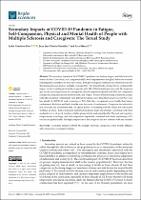| dc.contributor | Vall d'Hebron Barcelona Hospital Campus |
| dc.contributor.author | Martín-González, Juan José |
| dc.contributor.author | Maurel Ibáñez, Sara Nieves |
| dc.contributor.author | Giménez-Llort, Lydia |
| dc.date.accessioned | 2022-05-04T10:19:44Z |
| dc.date.available | 2022-05-04T10:19:44Z |
| dc.date.issued | 2021-09-18 |
| dc.identifier.citation | Giménez-Llort L, Martín-González JJ, Maurel S. Secondary Impacts of COVID-19 Pandemic in Fatigue, Self-Compassion, Physical and Mental Health of People with Multiple Sclerosis and Caregivers: The Teruel Study. Brain Sci. 2021 Sep 18;11(9):1233. |
| dc.identifier.issn | 2076-3425 |
| dc.identifier.uri | https://hdl.handle.net/11351/7474 |
| dc.description | COVID-19; Fatigue; Self-compassion |
| dc.description.abstract | The secondary impacts of the COVID-19 pandemic are distress triggers and risk factors for mental health. Conversely, self-compassion skills and compassionate thoughts/behaviors towards suffering may contribute to their alleviation. Both psychological constructs are interrelated in life-threatening diseases such as multiple sclerosis (MS). The Teruel Study retrospectively evaluated the impact of strict confinement on the 44 people with MS of this Spanish province and 24 caregivers, specifically assessing (1) fears and perceptions; (2) self-compassion (people with MS) and compassion (caregivers); (3) physical and mental health, and fatigue. Despite better housing conditions, people with MS considered confinement very difficult to handle, more than their caregivers, but they were less afraid of COVID-19 and worsening of MS. Still, they recognized worse health than before confinement. Reclusion and lack of walks were the worst of confinement. Caregivers also referred to lack of leisure and uncertainty–fear. All agreed the best was staying with the family, but some found ‘nothing’ positive. Self-compassion remained moderate–high and strongly correlated with their moderate levels of social function, vitality, physical role, and global health. Physical and cognitive fatigue scores were high, and self-compassion negatively correlated with them, explaining a 19% variance in global health. The high compassion of the caregivers did not correlate with any variable. |
| dc.language.iso | eng |
| dc.publisher | MDPI |
| dc.relation.ispartofseries | Brain Sciences;11(9) |
| dc.rights | Attribution 4.0 International |
| dc.rights.uri | http://creativecommons.org/licenses/by/4.0/ |
| dc.source | Scientia |
| dc.subject | Salut mental |
| dc.subject | Esclerosi múltiple |
| dc.subject | COVID-19 (Malaltia) |
| dc.subject.mesh | Multiple Sclerosis |
| dc.subject.mesh | Mental Health |
| dc.subject.mesh | Coronavirus Infections |
| dc.title | Secondary Impacts of COVID-19 Pandemic in Fatigue, Self-Compassion, Physical and Mental Health of People with Multiple Sclerosis and Caregivers: The Teruel Study |
| dc.type | info:eu-repo/semantics/article |
| dc.identifier.doi | 10.3390/brainsci11091233 |
| dc.subject.decs | esclerosis múltiple |
| dc.subject.decs | salud mental |
| dc.subject.decs | infecciones por Coronavirus |
| dc.relation.publishversion | https://doi.org/10.3390/brainsci11091233 |
| dc.type.version | info:eu-repo/semantics/publishedVersion |
| dc.audience | Professionals |
| dc.contributor.organismes | Institut Català de la Salut |
| dc.contributor.authoraffiliation | [Giménez-Llort L] Departament de Psiquiatria i Medicina Forense, Unitat de Psicologia Mèdica, Escola de Medicina, Universitat Autònoma de Barcelona, Bellaterra, Spain. Institut de Neurociències, Universitat Autònoma de Barcelona, Bellaterra, Spain. [Martín-González JJ] ATUEM (Asociación Turolense de Esclerosis Múltiple), Teruel, Spain. [Maurel S] Servei de Medicina, Vall d’Hebron Hospital Universitari, Barcelona, Spain. Universitat Autònoma de Barcelona, Bellaterra, Spain. Department of Neuroscience, Psychiatry, Universidad País Vasco, Leioa, Spain |
| dc.identifier.pmid | 34573254 |
| dc.identifier.wos | 000699479500001 |
| dc.rights.accessrights | info:eu-repo/semantics/openAccess |

